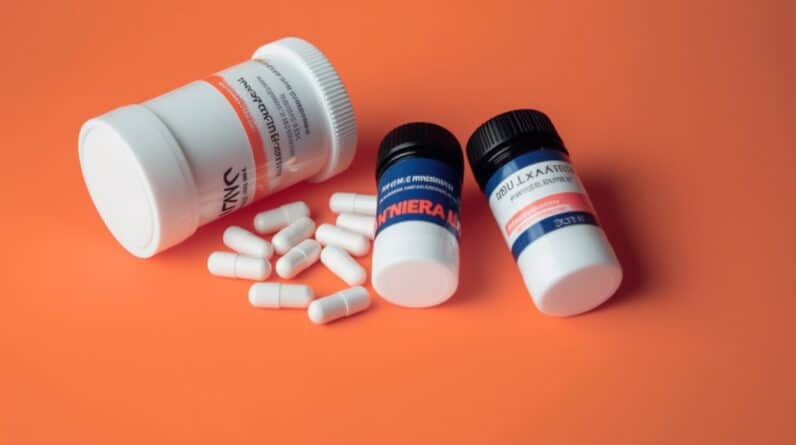
We may earn money or products from the companies mentioned in this post.
As an Amazon Associate I earn from qualifying purchases.
Table Of Contents
Introduction
Can you hear that? For many people, an incessant humming, buzzing, or ringing in their ears can take a tantalizing toll on their quality of life. This isn’t just a sound in your imagination—it’s a legitimate medical condition known as tinnitus. If you’ve been submerged underwater and heard the muted, warping noises of the aquatic world or felt the aftereffects of a loud concert buzzing in your ears, you’ve had a taste of what over 50 million Americans experience regularly. Understanding the complexity of tinnitus is vital because several medications prescribed for various ailments contribute to this intrusive sound. But let’s delve into the basics first.
What Is Tinnitus?
Tinnitus is a peculiar condition, isn’t it? Perceived sounds—buzzing, ringing, whistling—with no actual external source. These phantom auditory perceptions vary in pitch, volume, and pattern, and can be constant or periodic. It’s like your brain has tuned into a faulty radio channel. This sound disturbance without a physical origin can be quite frustrating, interfering with concentration, sleep, and everyday peace of mind. Tinnitus isn’t a disease in itself but is more typically a symptom of some other condition. Interestingly, it’s a common side effect of numerous prescription and over-the-counter medications.
Types of Tinnitus and Their Causes
The world of tinnitus is as varied as the sounds it encompasses. It often mimics the cacophony of a bustling city—whistles, hums, buzzes, clicks, roars, pulsations—and just as cities never sleep, these sounds can persist day and night. Two main types define it—Subjective, the most common type, perceivable only by the person affected, and Objective, a rare type where the sounds can be heard by both the individual and the doctor.
Tinnitus can arise due to a plethora of reasons, ranging from ear injuries, and circulatory problems, and, as surprising as it may sound, it’s often an unintended consequence of particular medications. Yes, the very drugs you might be consuming to alleviate one issue may be causing another in the form of bothersome tinnitus. The term for this strange phenomenon is drug-induced tinnitus. Intrigued yet? Let’s dissect this further and identify the usual culprits.
Drug-Induced Tinnitus
Every medication has its pros and cons, and sometimes, the balance can be tricky. Most drugs that cause tinnitus are deemed ‘ototoxic,’ meaning they are toxic to the ears. You might think, “That sounds severe!” and it does. However, the occurrence of ototoxic effects often depends on the dosage and duration of consumption. In some cases, when the medication is halted or the dosage is aligned, the tinnitus symptoms might fade away.
These ototoxic drugs don’t discriminate, ranging from certain antibiotics to chemotherapy drugs. This broad category makes it challenging to keep track. But it’s essential to understand that most cases of drug-induced tinnitus are due to higher doses. Nonetheless, occasional cases occur from over-the-counter medications—leading us to our next topic of discussion.
Over-the-counter Medications and Tinnitus
You might be baffled that certain medications within arm’s reach can trigger tinnitus. Not every aspirin or ibuprofen pops cause your ears to buzz, but regular, high-dose intake might tune you into unwanted radio frequencies.
Isn’t it surprising that this humble, ever-present aspirin, used for everything from headaches to heart conditions, can induce tinnitus? High-dose usage (usually about 8 to 12 pills a day) can trigger tinnitus and other hearing problems. The good news is that the effects are generally reversible once the dosage is reduced.
Similarly, ibuprofen, a common component in many pain relievers and anti-inflammatory drugs, at high doses, can invite tinnitus to be your constant companion. However, like aspirin, when you halt the medication, the tinnitus typically recedes.
These over-counter-drugs examples aren’t to scare you but emphasize the importance of regulation and awareness of what we consume. After all, knowledge is the first step toward prevention. In the next section, we’ll explore various prescription medications connected with tinnitus. Carry on, shall we?
Prescription Medications and Tinnitus
While it’s surprising that common, over-the-counter medications can lead to tinnitus, it’s a tad more astonishing that several prescribed medications can do the same. With greater power comes greater responsibility, so what might be these potent culprits?
Let’s start with antibiotics, valiant warriors against infections. It’s a shocker that these lifesavers can cast an unwelcome shadow in the form of tinnitus. Fasten your seatbelts, since the names can get bumpy—Erythromycin, Vancomycin, Neomycin—the list goes on. Most of these antibiotics, when administered intravenously at high doses for serious infections, pave the way for tinnitus.
Another class of medications contributing to the tinnitus choir is blood pressure medications. While helping your heart, they may simultaneously agitate your ears. Prime examples include certain diuretics and ACE inhibitors.
Additionally, mental health is pivotal, and antidepressants play a crucial role in maintaining it. However, specific antidepressants can cause or worsen tinnitus. Here’s the trickiest part—it’s usually not immediate. The tinnitus onset can often be weeks or even months into the therapy, making it challenging to establish an association.
Now, after unmasking these common perpetrators, here comes the burning question—what should you do if your medication seems to be triggering tinnitus?
What to Do If Your Medication Causes Tinnitus
Suspecting your medication is akin to waking up to a ticking time bomb in your ear—it can feel nerve-wracking. But hold on! Before you toss out all your medications, remember—most instances of medication-induced tinnitus are reversible. Consult your doctor and discuss your concern. They typically suggest a phased approach—tweak the medication dosage, switch to a different one, or evaluate whether the benefit outweighs the nuisance.
Before any drastic decision, self-reflection is key. Keep a symptom diary, documenting your medication intake, doses, and tinnitus intensity. This log could be instrumental in determining whether your medication is the rogue player behind your tinnitus symphony. Remember, observing and discussing your health concerns with a professional is always a step in the right direction.
Alternative Treatments for Tinnitus
Tinnitus can feel like an unwelcome visitor taking up residence in your ear, and while medications can sometimes be the cause, they can also help mitigate the consequences of this condition. However, just as various paths lead to the noisy mystery of tinnitus, there are multiple avenues available to find relief.
You might be thinking, “I don’t want to churn my sanity in the pharmaceutical merry-go-round.” No worries, as you do have other viable options. There exist numerous non-medicinal ways to counter tinnitus. While they may not completely eliminate the sounds, they can reduce the intensity significantly, therefore, lessening the impact on your life.
One option is sound therapy. By introducing a competing, but hopefully less obnoxious, sound into your environment, the symptoms of tinnitus can be masked or even retrained to a more manageable level. Static noise, environmental sounds, music, and specialized ear devices are just a few possibilities in the sound therapy spectrum.
Another approach is the neurological training route. Cognitive behavioral therapies, counseling, group support, and stress management are powerful tools in the tinnitus-busting arsenal; they help you deal with your tinnitus from a mental and emotional perspective, which can often make a difference.
However, just because these options exist outside of the medicine cabinet doesn’t mean they should be self-administered. As with all aspects of your health, always consult with a qualified medical professional before embarking on a new treatment regime. Armed with this knowledge, you are now in a better position to navigate the complex layers of tinnitus and find your path towards relief.
Conclusion
So, we’ve just journeyed through the winding labyrinth of tinnitus, navigating the specifics of its medication-induced variant. You’ve discovered that certain drugs, both common and specialist, have the unintentional side effect of causing or worsening tinnitus. It might have made it seem as though these drugs were the villains; crusaders in white come to heal, leaving a sonic echo in their wake. However, it’s essential to remember that in most cases, these effects are reversible or manageable with appropriate guidance and regulation.
Still, when it comes to your health, it’s integral to stay informed and make conscious choices. If you’re experiencing a persistent ringing, buzzing, or humming in your ears, it’s worthwhile to explore whether your medications could be the culprits. Engage with your healthcare provider—after all; they’re your travel partners in this health journey. Remember, information is your other loyal ally! So whether you’re learning about an allergy medication or pondering on a beta blocker, maintain that knowledge thirst. Maybe the sound of silence isn’t lost forever, but as they say, the journey is the most enriching part of an adventure.
What Drugs Cause Tinnitus - Frequently Asked Questions (FAQ)
Tinnitus is a phantom auditory perception characterized by a humming, buzzing, or ringing sound, generally heard in the ears or head without an external sound source.
Various prescription and over-the-counter medications are known to potentially cause tinnitus. These include certain antibiotics, over-the-counter pain relievers like aspirin or ibuprofen, specific blood pressure medications, and certain types of antidepressants.
Most cases of medication-induced tinnitus are reversible. When the medication dosage is adjusted or therapy is discontinued, the symptoms often fade away. However, each case is unique, and individuals should consult with their healthcare professionals to design an optimal plan catered to their specific needs.
As startling as it might sound, some over-the-counter medications such as aspirin or ibuprofen can contribute to tinnitus, particularly when consumed in large, frequent doses.
If you suspect your medication is causing tinnitus, you should immediately consult your healthcare provider. They can help align your medication dosage, suggest alternatives, or determine a suitable plan of action. Self-monitoring and reporting your symptoms can be crucial in reaching a diagnosis.
Amazon and the Amazon logo are trademarks of Amazon.com, Inc, or its affiliates.








